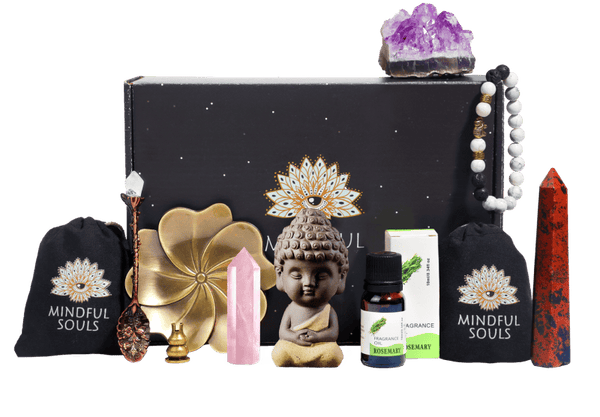
If you are looking for a meditation definition and a quick introduction to this ancient practice, you are in the right place! We’ll reveal different types of meditation, the benefits of meditation, and even give you a quick action guide on how to meditate. Read on!

What Is Meditation?
From Buddhism and Hinduism to Christianity, Judaism, Islam, and beyond - almost every religion in the world has some form of meditation traditions and practices. It’s an ancient practice that transcended generations for thousands of years with undeniable benefits for the body, mind, and soul!
Meditation is not about shutting off your thoughts but rather becoming an observer. Through this practice, you can see your thoughts from the side and learn about them without any judgment.
And while meditation can be heavily linked to religion, it is mostly about doing it independently, without any attachments.

Different Types of Meditation
Meditation involves a large variety of different approaches. Some are ancient, while other forms emerged in the last decades. Let’s see the most popular types of meditation:
Guided Meditation
Meditating is not easy; therefore, a lot of people search for guidance. And in this digital age, guided meditation has become very popular.
Guided meditation can come in a variety of ways to achieve or enhance the deeper meditative state. It ranges from meditating under the guidance of a teacher to using an app or playing a youtube video, meditation music, and many more.
Sleep Meditation
Sleep meditation is primarily used to help you fall asleep faster. Meditating for sleep is usually done while lying in bed and possibly listening to relaxing sounds simultaneously.
The primary purpose of sleep meditation is to ease or eliminate any obstacles that stand in the way of good quality sleep - these might be tension in your body, worrying thoughts, or anything else that’s bothering you to fall asleep.
Vipassana Meditation
Vipassanā is a Buddhist term that is often translated as "insight" or “sees.” In the ancient Pali language of Buddhism, the word ”Vipassana” means “seeing things as they are.” And this type of meditating is all about the training of the mind.
Vipassana meditation is sometimes referred to as “mindfulness meditation practice” because it focuses explicitly on observing your thoughts and emotions without judging or dwelling on them, which is essentially the primary purpose of meditating.
Kundalini Meditation
Kundalini meditation is a powerful technique that is a part of Kundalini yoga. This type of meditation is a path towards spiritual enlightenment through self-appreciation and energy regulation.
Kundalini's energy allows creating a powerful bond between the body and mind. It may also improve cognitive functioning, boost self-perception, and confidence. This practice can become your insight meditation.

What Should You Know About Meditation Before You Begin?
Meditation might look easy at first. After all, all you have to do is sit down, cross your legs and close your eyes for 10 minutes. But before you begin, you should be aware that it takes time and consistency to get better at meditating.
Try not to have unreasonable expectations. This mindful activity can help you achieve a lot - but you’ll get disappointed if the effects of meditation after one or two sessions are not everything you wished. 
Research Shows Incredible Results
In the past few decades, various studies showed and revealed how meditating could bring you different benefits! Whether it’s a randomized controlled trial, a peer study, or watching a control group of people - all studies that have been done can be pretty inspiring and motivating.
Therefore, we gathered a couple of studies for you to digest:
- More kids than ever are discovering the benefits and joys of meditation, as use among children has increased significantly! At the same time, yoga for kids also surged in popularity.
- Good quality sleep is more than essential for recharging your body and mind to function correctly and achieve results. And if you ever wanted to improve your sleep, then this study, as well as this research, should inspire you to meditate more.
- One study revealed that people who suffer from back pain and meditate would be more likely to experience improvement than those who only use medication. For some, meditation and other mindful activities such as yoga can even help regain or improve their ability to carry out essential daily tasks.
A good meditation program done consistently can also help with heart disease, chronic pain, reduce stress, anxiety, and depression. Meditation includes and works with a specific part of the brain known as the pre-frontal cortex, responsible for awareness, focus, and decision-making!

Mindfulness & Meditation: Is There a Difference?
These two go hand in hand - but do not mean the same, nor do they accompany each other to the same extent in different practices.
Mindfulness is about the quality of living or simply just - being. Or in other words, it is an ability to assert, react, and respond to a situation appropriately. It dispels irrational beliefs, heated emotions, criticism, and other unhelpful and unhealthy habits we tend to possess
Many use crystals because crystals can assist you in creating intentions, becoming more self-aware, or even connecting to the universe. Also, they may complement your meditation sessions in many unique ways.

Meditation For Beginners: How to Meditate?
As we showed before, there are many different types of meditation techniques. And if you’re just starting - it’s easy to feel lost.
Our advice is to start small and learn the basics first. While there is no single right way to do it - you can create your version if you wish.
You can learn to meditate with some essential tips and guidelines done step by step:
- First, sit or lie down - whichever makes you feel more comfortable.
- Give yourself 5 minutes. After you get used to it - you can prolong your time.
- Now just listen to yourself.
- It may feel a little unusual at first because the mind is a strange place full of “noise.” And sitting in silence is no more familiar, so it might even feel uncomfortable. But stick to it - it will become much more pleasant in the process.
- The key is not to try to get rid of your thoughts. The harder you'll attempt to clear your mind - the more persistent and annoying your thoughts will become.
- Instead of trying to be a moderator - be an observer and notice your thoughts. Notice your feelings. Observe, but don't judge - let them flow through you like a wave.

Don’t Forget Consistency
Meditation is a skill - so it takes a while to get familiar with the process. But no matter how good your abilities to tune out the outer world are getting - the true success lies in your ability to be consistent with the practice.
That’s why people often choose daily meditation. While it is a commitment and discipline, sitting down for a few minutes each day can help establish a routine that will ground and teach you to be attentive to the inner self.

When To Meditate?
Morning meditation practice can help you prepare for your day, set intentions, gain confidence, and concentrate.
Evening meditation - can help you wind down, appreciate the day, connect to yourself.
But those are just a few benefits you'll notice along the way, no matter when you meditate. Some other particular advantages you must discover for yourself in due time.

Conclusion: Extra Tips & Mindfulness
And suppose you need a bit more encouragement, interesting ritual descriptions, or crystals to make your meditation sessions even more powerful and purposeful. You’ll find everything in the Mindful Souls box. Every box will delight you with 6-8 carefully hand-picked items, ranging from calming crystals, aromatherapy items, gemstone jewelry, home decor, wellness goodies, and natural cosmetics. And remember, meditation is not about the destination, rather the journey to loving-kindness.
So, shall we meditate? I’ll do it with you - breathe in, breathe out.
Namaste



